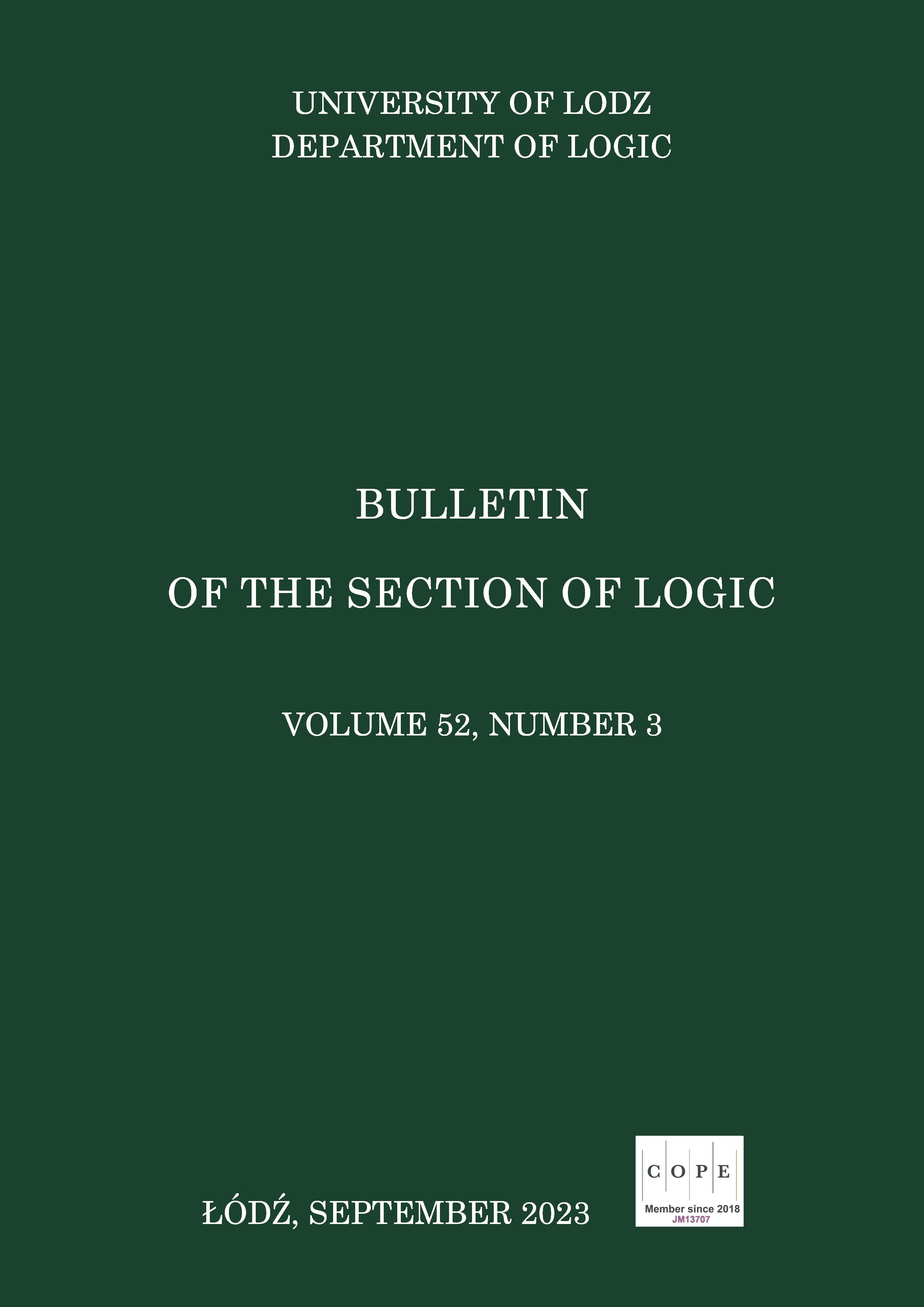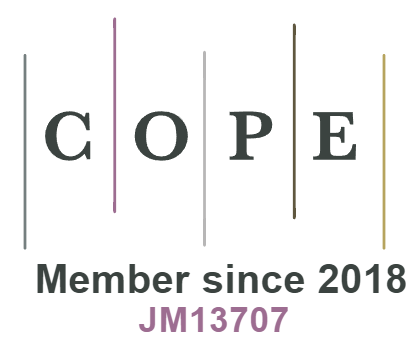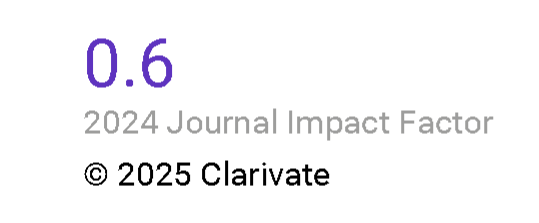Supposition: A Problem for Bilateralism
DOI:
https://doi.org/10.18778/0138-0680.2023.07Keywords:
assertion, denial, negation, supposition, assumptions, speech actsAbstract
In bilateral logic formulas are signed by + and –, indicating the speech acts assertion and denial. I argue that making an assumption is also speech act. Speech acts cannot be embedded within other speech acts. Hence we cannot make sense of the notion of making an assumption in bilateral logic. Attempts to solve this problem are considered and rejected.
References
E. Anscombe, P. T. Geach (eds.), Descartes. Philosophical Writings., Nelson and Sons, London (1954).
Google Scholar
M. Dummett, Frege. Philosophy of Language, 2nd ed., Duckworth, London (1981).
Google Scholar
M. Dummett, The Source of the Concept of Truth, [in:] The Seas of Language, Clarendon, Oxford (1993), pp. 188–201, DOI: https://doi.org/10.1093/0198236212.003.0008
Google Scholar
DOI: https://doi.org/10.1093/0198236212.003.0008
N. Francez, Bilateralism in Proof-Theoretic Semantics, Journal of Philosophical Logic, vol. 43 (2014), pp. 239–259, DOI: https://doi.org/10.1007/s10992-012-9261-3
Google Scholar
DOI: https://doi.org/10.1007/s10992-012-9261-3
G. Frege, Begriffsschrift. Eine der arithmetischen nachgebildete Formelsprache des reinen Denkens, Louis Nebert, Halle (1879).
Google Scholar
G. Frege, Funktion und Begriff, Vortrag, gehalten in der Sitzung vom 9. Januar 1891 der Jenaischen Gesellschaft für Medicin und Naturwissenschaften, Jena (1891).
Google Scholar
DOI: https://doi.org/10.1111/j.1438-8677.1891.tb05760.x
G. Frege, Über Sinn und Bedeutung, Zeitschrift für Philosophie und philosophische Kritik, vol. 100 (1892), pp. 26–50.
Google Scholar
G. Frege, Grundgesetze der Arithmetik. Begriffsschriftlich abgeleitet. II. Band., Hermann Pohle, Jena (1903).
Google Scholar
G. Frege, Über die Grundlagen der Geometrie. II, Jahresberichte der Deutschen Mathematiker-Vereinigung, vol. 15 (1906), pp. 377–403.
Google Scholar
G. Frege, Der Gedanke. Eine logische Untersuchung, Beiträge zur Philosophie des deutschen Idealismus, vol. 1 (1918), pp. 58–77.
Google Scholar
DOI: https://doi.org/10.1515/bgsl.1918.1918.43.219
G. Frege, Die Verneinung. Eine logische Untersuchung, Beiträge zur Philosophie des deutschen Idealismus, vol. 1 (1918), pp. 143–157.
Google Scholar
G. Frege, Gedankengefüge. Eine logische Untersuchung, Beiträge zur Philosophie des deutschen Idealismus, vol. 3 (1918), pp. 36–51.
Google Scholar
P. Geach, Assertion, [in:] Logic Matters, Blackwell, Oxford (1972), pp. 254–269.
Google Scholar
P. Geach, M. Black (eds.), Translations from the Philosophical Writings of Gottlob Frege, Blackwell, Oxford (1952).
Google Scholar
G. Gentzen, Untersuchungen über das logische Schließen, Mathematische Zeitschrift, vol. 39 (1934), pp. 176–210, 405–431, DOI: https://doi.org/10.1007/BF01201353,10.1007/BF01201363
Google Scholar
DOI: https://doi.org/10.1007/BF01201363
G. Gentzen, The Collected Papers of Gerhard Gentzen, North Holland, Amsterdam (1969).
Google Scholar
M. Green, The Status of Supposition, Noûs, vol. 34(3) (2000), pp. 376–399, DOI: https://doi.org/10.1111/0029-4624.00216
Google Scholar
DOI: https://doi.org/10.1111/0029-4624.00216
R. Hare, The Language of Morals, Clarendon, Oxford (1952), DOI: https://doi.org/10.1093/0198810776.001.0001
Google Scholar
DOI: https://doi.org/10.1093/0198810776.001.0001
O. T. Hjortland, Speech acts, categoricity, and the meanings of logical connectives, Notre Dame Journal of Formal Logic, vol. 55(4) (2014), pp. 445–467, DOI: https://doi.org/10.1215/00294527-2798700
Google Scholar
DOI: https://doi.org/10.1215/00294527-2798700
L. Humberstone, The Revival of Rejective Negation, Journal of Philosophical Logic, vol. 29 (2000), pp. 331–381, DOI: https://doi.org/10.1023/A:1004747920321
Google Scholar
DOI: https://doi.org/10.1023/A:1004747920321
Ignatius of Loyola, Personal Writings, Penguin, London (2005).
Google Scholar
L. Incurvati, P. Smith, Is ‘no’ a force-indicator? Sometimes, possibly, Analysis, vol. 72(2) (2012), pp. 225–231, DOI: https://doi.org/10.1093/analys/ans048
Google Scholar
DOI: https://doi.org/10.1093/analys/ans048
S. Jaśkowski, On the Rules of Suppositions in Formal Logic, Studia Logica, vol. 1 (1934), pp. 5–32.
Google Scholar
B. Jespersen, Two Tales of the Turnstile, Journal of Applied Logics, vol. 8(2) (2021), pp. 511–530.
Google Scholar
J. Kearns, Propositional Logic of Supposition and Assertion, Notre Dame Journal of Formal Logic, vol. 38(3) (1997), pp. 325–349, DOI: https://doi.org/10.1305/ndjfl/1039700742
Google Scholar
DOI: https://doi.org/10.1305/ndjfl/1039700742
N. Kürbis, Intuitionist Bilateralism: Negations, Implications and some Observations and Problems about Hypotheses, [in:] J. Fichot, T. Piecha (eds.), Beyond Logic. Proceedings of the Conference held in Cerisy-la-Salle, 22–27 May 2017 (2017), pp. 429–438, DOI: https://doi.org/10.15496/publikation-18676
Google Scholar
N. Kürbis, Proof and Falsity. A Logical Investigation, Cambridge University Press (2019), DOI: https://doi.org/10.1017/9781108686792
Google Scholar
DOI: https://doi.org/10.1017/9781108686792
N. Kürbis, Normalisation for Bilateral Classical Logic with some Philosophical Remarks, The Journal of Applied Logics, vol. 8(2) (2021), pp. 531–556.
Google Scholar
N. Kürbis, Note on ‘Normalisation for Bilateral Classical Logic with some Philosophical Remarks’, Journal of Applied Logics, vol. 8(7) (2021), pp. 2259–2261.
Google Scholar
H. Price, Sense, Assertion, Dummett and Denial, Mind, vol. 92 (1983), pp. 161–173, DOI: https://doi.org/10.1093/mind/XCII.366.161
Google Scholar
DOI: https://doi.org/10.1093/mind/XCII.366.161
H. Reichenbach, Elements of Symbolic Logic, Macmillan, London (1966).
Google Scholar
G. Restall, Multiple Conclusions, [in:] P. Hájek, L. Valdés-Villanueva, D. Westerståhl (eds.), Logic, Methodology and Philosophy of Science: Proceedings of the Twelfth International Congress, King’s College Publications, London (2005), pp. 189–205.
Google Scholar
G. Restall, Speech acts & the quest for a natural account of classical proof (2021), URL: https://consequently.org/papers/speech-acts-for-classical-natural-deduction.pdf
Google Scholar
I. Rumfitt, “Yes” and “No”, Mind, vol. 109 (2000), pp. 781–823, DOI: https://doi.org/10.1093/mind/109.436.781
Google Scholar
DOI: https://doi.org/10.1093/mind/109.436.781
I. Rumfitt, Unilateralism Disarmed: A Reply to Dummett and Gibbard, Mind, vol. 111 (2002), pp. 305–312, DOI: https://doi.org/10.1093/mind/111.442.305
Google Scholar
DOI: https://doi.org/10.1093/mind/111.442.305
J. Searle, Speech Acts. An Essay in the Philosophy of Language, Cambridge University Press (1969), DOI: https://doi.org/10.1017/CBO9781139173438
Google Scholar
DOI: https://doi.org/10.1017/CBO9781139173438
T. Smiley, Rejection, Analysis, vol. 56 (1996), pp. 1–9, DOI: https://doi.org/10.1093/analys/56.1.1
Google Scholar
DOI: https://doi.org/10.1093/analys/56.1.1
E. Stenius, Mood and Language-Game, Synthese, vol. 17(3) (1967), pp. 254–274, DOI: https://doi.org/10.1007/bf00485030
Google Scholar
DOI: https://doi.org/10.1007/BF00485030
Teresa of Avila, The Life of Saint Teresa of Avila by Herself, Penguin, London (1988).
Google Scholar
M. Textor, Frege on Judging as Acknowledging the Truth, Mind, vol. 119(475) (2010), pp. 615–655, DOI: https://doi.org/10.1093/mind/fzq041
Google Scholar
DOI: https://doi.org/10.1093/mind/fzq041
M. Textor, Is ‘no’ a force indicator? No!, Analysis, vol. 71(3) (2011), pp. 448–456, DOI: https://doi.org/10.1093/analys/anr050
Google Scholar
DOI: https://doi.org/10.1093/analys/anr050
M. van der Schaar, Frege on Judgement and the Judging Agent, Mind, vol. 127(505) (2018), pp. 225–250, DOI: https://doi.org/10.1093/mind/fzw059
Google Scholar
DOI: https://doi.org/10.1093/mind/fzw059
B. Weiss, Let’s admit defeat! Assertion, Denial and Retraction, [in:] O. Beran, V. Kolman, L. Koreň (eds.), From Rules to Meanings: New Essays on Inferentialism, Routledge, London, New York (2018).
Google Scholar
DOI: https://doi.org/10.4324/9781315103587-5
Downloads
Published
How to Cite
Issue
Section
License

This work is licensed under a Creative Commons Attribution-NonCommercial-NoDerivatives 4.0 International License.















